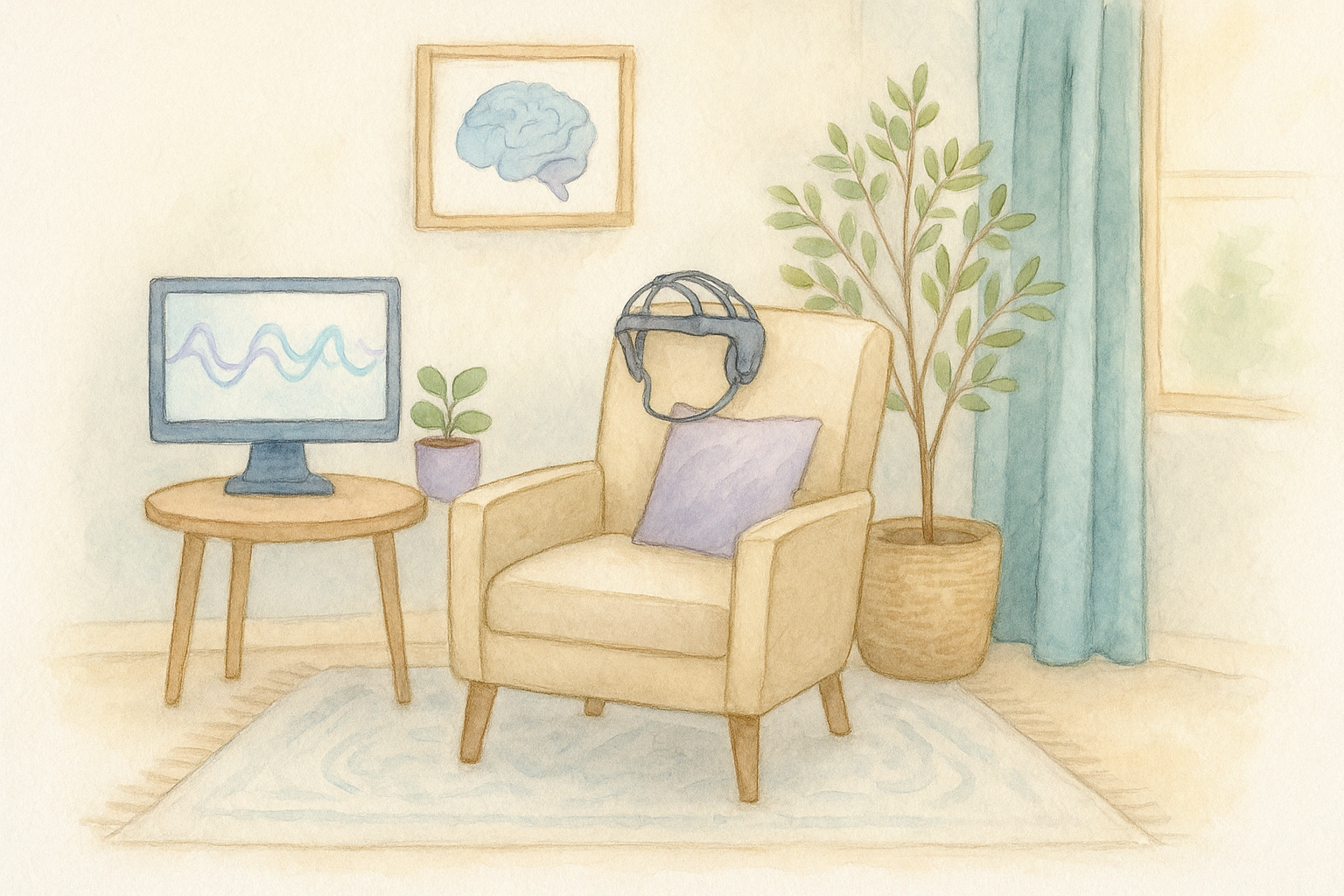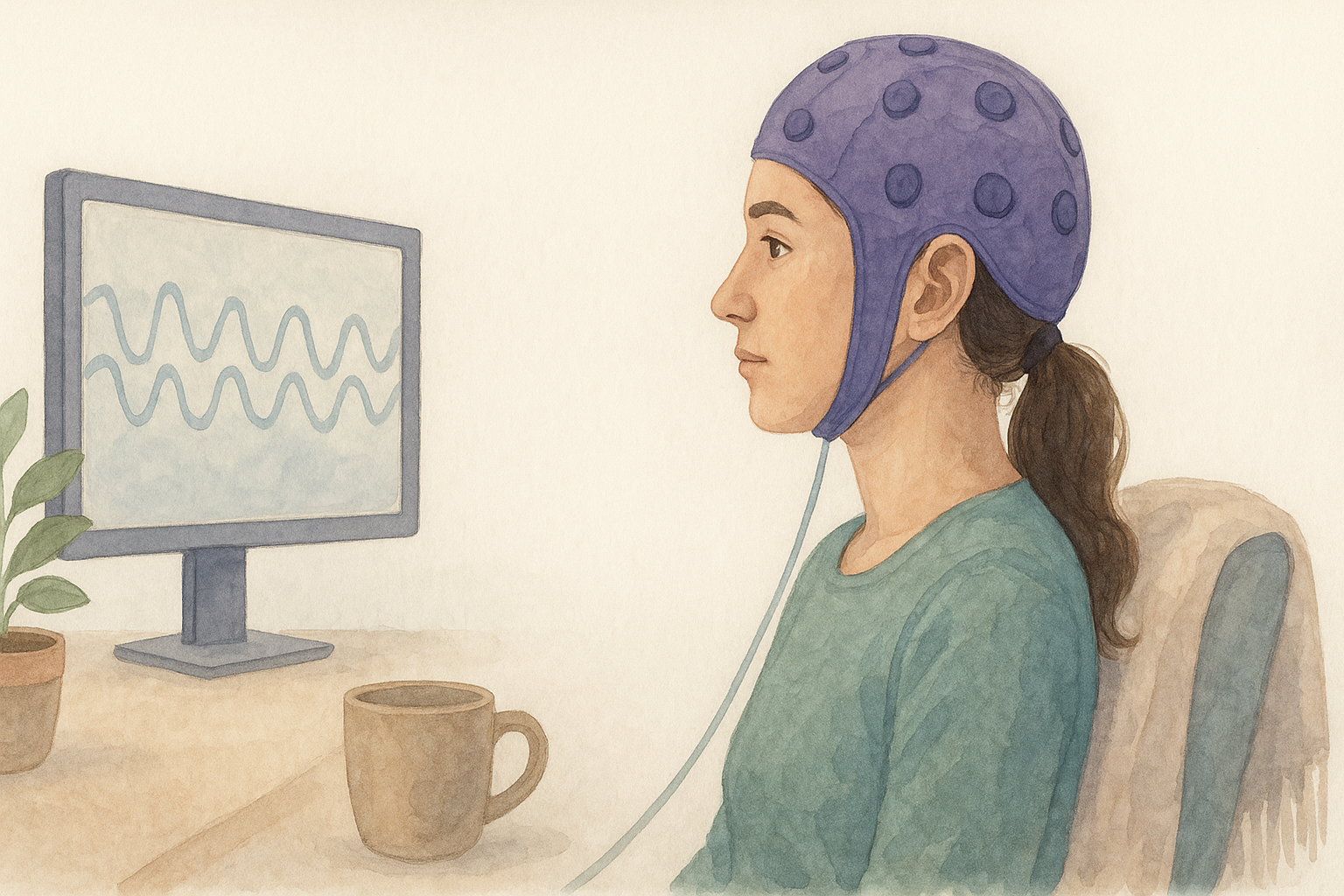In Person:
160 Christian St, Oxford, CT 06478
Online Therapy:
Connecticut, Maryland, Virginia and Florida. HIPAA. Secure Video. Convenient. In-Person in CT
Call: 802-578-3700 or Email: connect@mindbodywelltherapy.com
A holistic psychotherapy practice offering ketamine-assisted psychotherapy and integrative mental health care
160 Christian St, Oxford, CT 06478
Connecticut, Maryland, Virginia and Florida. HIPAA. Secure Video. Convenient. In-Person in CT
Call: 802-578-3700 or Email: connect@mindbodywelltherapy.com
Neurofeedback Therapy in CT created 5-26-2025 ~ Written by Lucrezia Mangione, LPC, LCPC, NCC, BC-TMH, DCEP

If your brain feels foggy, your body tense, and your emotions stuck on high alert—or low power—neurofeedback may help you reset. At Mind Body Well Therapy, we offer neurofeedback therapy to adults across Connecticut through both in-person and telehealth sessions.
Our approach is grounded in neuroscience, informed by the nervous system, and tailored for sensitive and overwhelmed professionals, caregivers, and healers who are ready to reclaim focus, clarity, and emotional steadiness.
Neurofeedback is a safe, non-invasive form of brain training that
helps your brain learn to self-regulate. By using sensors to read your
brainwave activity and providing real-time feedback, neurofeedback helps
your brain build new patterns that support better mood, focus, sleep,
and resilience.
At Mind Body Well Therapy, we provide amplitude and coherence training and partner with QEEG providers.
Our work is informed by Attuned Neurofeedback, a model developed by Sebern Fisher and Dr. Ed Hamlin. This approach blends scientific precision with deep attunement to the emotional and energetic states of each client.
Unlike meditation or mindfulness apps, neurofeedback works directly with your brain’s electrical activity to promote self-regulation on a subconscious level. Similar to meditation and mindfulness, it is non-invasive.
Neurofeedback is especially helpful if you:
Whether you're navigating a demanding life season or you've tried other approaches that didn’t go deep enough, neurofeedback meets your brain where it is and helps it move toward balance.
Your brain is always learning. With neurofeedback, we help it learn what regulation feels like.
During
a session, you relax in a chair while sensors measure your brainwave
activity. A computer system provides feedback—often through subtle
changes in sound, music, or video—that gently guides your brain back
into healthier patterns. This process taps into your brain’s natural
neuroplasticity.

Most sessions are 50–60 minutes. Clients typically come once or twice a
week. Or they train in the comfort of their home 2 or more times weekly. A typical neurofeedback training experience ranges from 30 to 50 sessions, depending on your goals and progress.
We offer in-person sessions at our Oxford, CT office and virtual neurofeedback for residents across Connecticut with user-friendly equipment that works remotely.
We’re a holistic practice that integrates neuroscience, somatic awareness, and heart-centered care. Our neurofeedback services are part of a broader support system that honors the whole person—mind, body, spirit, and nervous system.
Research supports the use of neurofeedback in treating anxiety, ADHD, trauma, and sleep challenges. It’s been used for decades in clinical and performance settings—including athletes, musicians, and NASA astronauts.
Numerous peer-reviewed studies and clinical trials over the past 30 years support neurofeedback’s role in improving mood, attention, and sleep.

Words from clients:
"My mind used to be nonstop. Now there’s more space between my thoughts. I didn’t know that was possible."
"I haven’t had a panic episode in weeks. That used to be my normal. Not anymore."
"Things that used to set me off just don’t anymore. I have more space between the trigger and my reaction."
"I’m finally sleeping through the night without waking up anxious. It’s like my brain learned how to rest."
We offer free informational calls and monthly Q&A sessions about neurofeedback therapy in Connecticut. You’re welcome to reach out with questions before deciding if this is the right next step for you.
Once
you reach out, we’ll respond within 1–2 business days with options to
schedule a consult or begin care. During our consult, we’ll discuss your
goals, how the process works, and the best starting point for you.
Rates vary depending on if you need holistic therapy or have your own therapist. Reach out and ask. We’re here to have an easy discussion about your options during your consultation.
Most clients combine neurofeedback with talk therapy or ketamine-assisted psychotherapy to support deeper emotional integration.
Contact us to schedule a consult or learn more.
This content of Neurofeedback Therapy in CT was authored by Lucrezia Mangione, LCPC, LPC, NCC, BC-TMH, DCEP. AI-assisted tools were used during the writing process to support clarity and organization. All professional insights and conclusions reflect her research on the subject, clinical expertise and training.
Ready to take the next step? Let’s explore what support could look like—at a pace that feels right for you. There's no pressure. Just a chance to see whether this feels like a good fit.
Mind Body Well Therapy, PLLC is a private psychotherapy practice offering holistic mental health counseling, ketamine-assisted psychotherapy, and supportive services for adults navigating periods of emotional strain.
This website provides general information and is not intended for self-diagnosis or to replace medical or psychological care. For diagnosis or treatment, please consult a licensed professional directly.
Explore our privacy policy of services and disclaimer for more details. We're here to support you on your journey to well-being.

Lucrezia Mangione supports people who feel anxious, overwhelmed, or worn down in building steadiness, clarity, and a deeper sense of aliveness. She also collaborates with therapists and helping professionals to support clients who feel stuck or stalled. Her integrative approach helps people feel calm, grounded, and more at home in themselves—living and working with greater ease and intention.